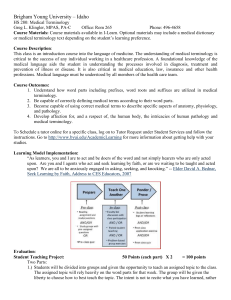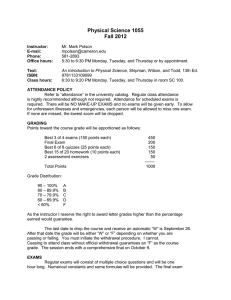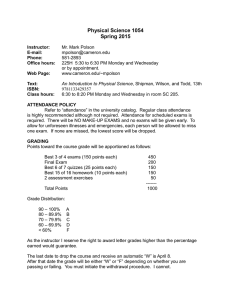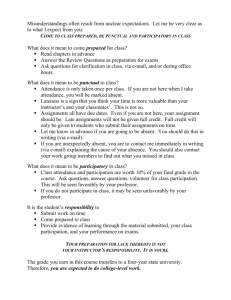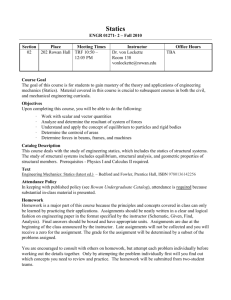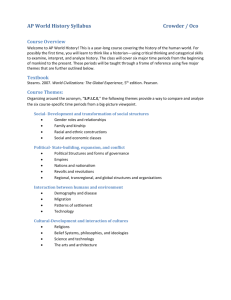HS 320 - Brigham Young University
advertisement
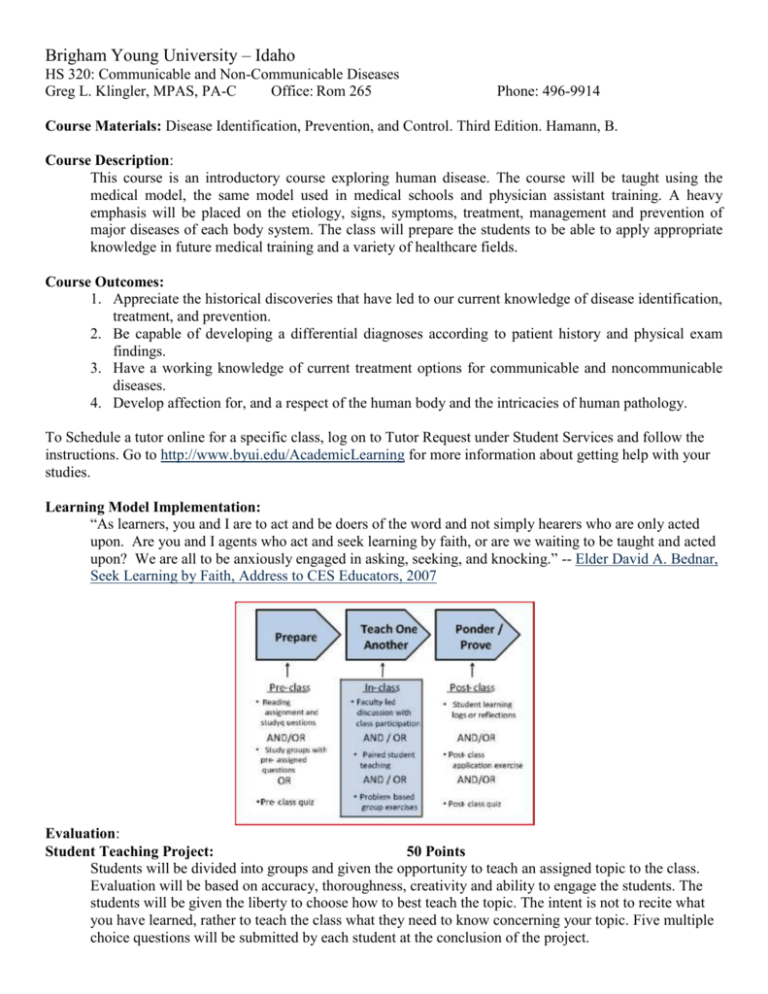
Brigham Young University – Idaho HS 320: Communicable and Non-Communicable Diseases Greg L. Klingler, MPAS, PA-C Office: Rom 265 Phone: 496-9914 Course Materials: Disease Identification, Prevention, and Control. Third Edition. Hamann, B. Course Description: This course is an introductory course exploring human disease. The course will be taught using the medical model, the same model used in medical schools and physician assistant training. A heavy emphasis will be placed on the etiology, signs, symptoms, treatment, management and prevention of major diseases of each body system. The class will prepare the students to be able to apply appropriate knowledge in future medical training and a variety of healthcare fields. Course Outcomes: 1. Appreciate the historical discoveries that have led to our current knowledge of disease identification, treatment, and prevention. 2. Be capable of developing a differential diagnoses according to patient history and physical exam findings. 3. Have a working knowledge of current treatment options for communicable and noncommunicable diseases. 4. Develop affection for, and a respect of the human body and the intricacies of human pathology. To Schedule a tutor online for a specific class, log on to Tutor Request under Student Services and follow the instructions. Go to http://www.byui.edu/AcademicLearning for more information about getting help with your studies. Learning Model Implementation: “As learners, you and I are to act and be doers of the word and not simply hearers who are only acted upon. Are you and I agents who act and seek learning by faith, or are we waiting to be taught and acted upon? We are all to be anxiously engaged in asking, seeking, and knocking.” -- Elder David A. Bednar, Seek Learning by Faith, Address to CES Educators, 2007 Evaluation: Student Teaching Project: 50 Points Students will be divided into groups and given the opportunity to teach an assigned topic to the class. Evaluation will be based on accuracy, thoroughness, creativity and ability to engage the students. The students will be given the liberty to choose how to best teach the topic. The intent is not to recite what you have learned, rather to teach the class what they need to know concerning your topic. Five multiple choice questions will be submitted by each student at the conclusion of the project. Quizzes/Assignments/Case Studies: 10 x 10 Points = 100 Points Weekly quizzes, assignments or case studies will be assigned prior to arriving to class the first day of each week. The quiz will evaluate the material discussed in the upcoming week. Preparation prior to arriving to class is vital to allow the Holy Ghost to assist you in learning and teaching. Each quiz/Assignment/Case Study will be announced and administered on I-Learn. Exams: 50 Points x 4 = 200 Points An exam will be given at the conclusion of each unit. Each exam with be administered in the testing center and will be multiple choice. There will be no make-up exams unless previously approved. Class Attendance/Preparation/Participation: 50 Points “The challenge before us is to create even more powerful and effective learning experiences in which students have opportunities to take action… where prepared students, exercising faith, step out beyond the light they already possess, to speak, to contribute, and to teach one another…. It is in that moment that the Spirit teaches.” President Kim B. Clark, Inaugural Response, Oct 11. 2005. Students are required to be present at each class and make meaningful contributions to the learning and development of the other students. Five points will be subtracted from the 50 points if you are not in attendance or if you did not make a meaningful contribution to that day’s learning experience. Research Project: 100 Points Each student will be required to research a previously-approved disease or disease related topic. A widerange of topics will be accepted for research. The student is given freedom to create a research project that will add value to their educational or professional goals and personal development. The research project should also be designed to bring awareness to the disease or disease state and assist other individuals on campus or in the community as to the importance of prevention, early detection and potential dangers of your topic. Grades will be given on the effectiveness reaching these goals. This project can be done individually or in groups of up to four. Total: Student Teaching Project: Quizzes/Assignments/Case Studies Exams Attendance/Participation Research Project 50 Points 100 Points 200 Points 50 Points 100 Points 500 Points 10% 20% 40% 10% 20% Total grade Honor Code: All students are expected to be in compliance, and follow strict adherence to the dress and grooming standards outlined in the Honor Code. Any student that is not in compliance will be asked to leave the class and asked to return when in compliance. Each student will also be required follow the academic honesty policy of the Honor Code. Any student found to have been violation of this policy will be penalized on an individual basis. http://www.byui.edu/StudentHonor/ The instructor reserves the right to make changes and correction to the above assignment and grading process at any time to facilitate the course. In compliance with the Americans with Disabilities Act, All qualified students enrolled in this course are entitled to ‘reasonable accommodation.” It is the student’s responsibility to disclose to the teacher any special need she/he may have before the end of the first week of class.
